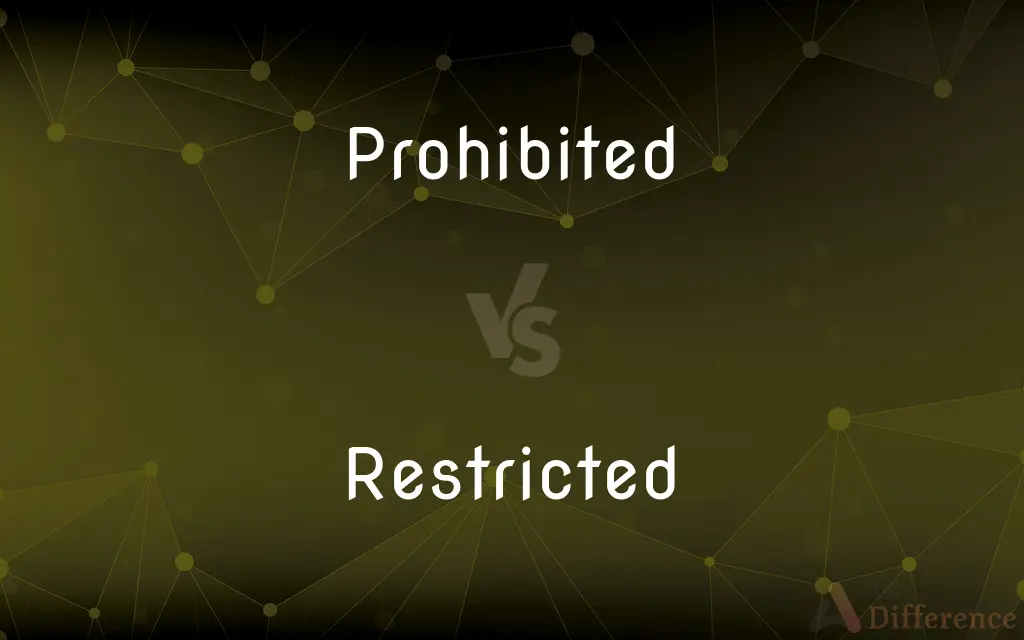Prohibited vs. Restricted — What's the Difference?
Edited by Tayyaba Rehman — By Fiza Rafique — Published on November 17, 2023
"Prohibited" means something is expressly forbidden by law or rule, while "Restricted" means there are specific conditions or limitations placed on its use or access.

Difference Between Prohibited and Restricted
Table of Contents
ADVERTISEMENT
Key Differences
"Prohibited" and "Restricted" both refer to limitations but vary in degree and nature. When something is prohibited, it's completely forbidden, meaning there's no circumstance under which it's allowed. On the contrary, when something is restricted, it signifies that it's allowed but only under certain conditions or within particular bounds.
Let's consider an example: In many places, smoking is "prohibited" inside restaurants, meaning it's entirely disallowed. On the other hand, the age to purchase alcohol might be "restricted" to those 21 and older. This doesn't mean alcohol sales are wholly banned; it's simply confined to a certain age group.
At the core, "prohibited" denotes an absolute barrier, a definitive "no." It's unequivocal in its stance. "Restricted", however, is more about setting parameters or conditions. It implies that while something might be allowed, it comes with specific limitations.
In legal and regulatory contexts, these terms hold significant weight. A "prohibited" act can lead to severe penalties, reflecting its complete disallowance. "Restricted" actions, however, are more about adherence to the outlined conditions, ensuring that the act stays within the defined bounds.
Consider a wildlife reserve: Hunting might be "prohibited," meaning no hunting is allowed at all. However, entry to the reserve might be "restricted" to daylight hours, implying you can visit, but only during specified times.
ADVERTISEMENT
Comparison Chart
Nature
Absolute disallowance
Conditional allowance
Scope
Total ban
Limitation
Example
"Drugs are prohibited."
"Entry is restricted to members."
Common Context
Rules where no exceptions are made
Rules with specific conditions or exceptions
Outcome
Complete prevention
Controlled or conditional access
Compare with Definitions
Prohibited
Prevented from doing something.
Minors are prohibited from entering the bar.
Restricted
Confined within set boundaries.
This area is restricted to employees.
Prohibited
Expressly forbidden by an authority.
Cell phones are prohibited during the exam.
Restricted
Limited in extent, number, or scope.
The club has restricted membership.
Prohibited
Not allowed by law or rule.
Parking is prohibited in front of the fire hydrant.
Restricted
Kept within certain limits.
His internet usage was restricted after 10 pm.
Prohibited
Banned from being made or used.
These chemicals are prohibited for household use.
Restricted
Conditional access or use.
The software is restricted to licensed users.
Prohibited
Completely barred from action.
Swimming is prohibited in this lake.
Restricted
Regulated by certain conditions.
Sale of these items is restricted to those over 21.
Prohibited
To forbid by authority
Smoking is prohibited in most theaters.
Restricted
Kept within certain limits; limited
On a restricted diet.
Prohibited
To prevent; preclude
Modesty prohibits me from saying what happened.
Restricted
Excluding or unavailable to certain groups
A restricted area.
Prohibited
Forbidden; unallowed
Restricted
Available only to authorized persons
A restricted file.
Prohibited
Simple past tense and past participle of prohibit
Restricted
Simple past tense and past participle of restrict
Prohibited
Excluded from use or mention;
Forbidden fruit
In our house dancing and playing cards were out
A taboo subject
Restricted
Limited within bounds.
Prohibited
Forbidden by law
Restricted
Available only to certain authorized groups of people.
Restricted area
Restricted access
A restricted military document
Restricted
Only available to customers who do not belong to racial, ethnic or religious minorities.
Restricted
Subject to restriction or subjected to restriction;
Of restricted importance
Restricted
Restricted in meaning; (as e.g. `man' in `a tall man')
Restricted
Curbed or regulated;
Controlled emotions
Restricted
The lowest level of official classification for documents
Common Curiosities
What does "prohibited" mean?
"Prohibited" refers to actions or items that are formally forbidden by law, regulation, or authority.
How does "prohibited" relate to "prohibition"?
"Prohibition" is the act of forbidding something, while "prohibited" describes the state of being forbidden.
Is something prohibited always illegal?
Not necessarily. While many prohibited actions are illegal, some might just be against a particular policy or set of rules without legal implications.
Can "prohibited" be temporary?
Yes, certain actions can be prohibited for a specific time or under certain conditions.
Does "prohibited" always imply a penalty for violation?
Typically, yes. There's often a penalty or consequence associated with doing something that's prohibited.
How does "prohibited" differ from "banned"?
They're synonymous in many contexts, but "banned" might imply a more forceful or complete prohibition.
What does "restricted" mean?
"Restricted" refers to actions, areas, or items that are limited or constrained by specific rules or regulations.
Can you use "prohibited" in a sentence?
Certainly: "Smoking is prohibited in this building."
Is "prohibited" a legal term?
It can be. Many legal documents or regulations use the term "prohibited" to indicate actions or items that are not allowed.
Are all prohibited items listed explicitly?
Not always. Some regulations might prohibit categories of items or actions, rather than listing each one.
Is "restricted" a flexible term?
It can be. Restrictions can be adjusted based on changing conditions or policies.
How can "restricted" be used in a sentence?
For example: "Access to this area is restricted to authorized personnel."
Can items be restricted based on age?
Yes, for instance, alcohol sales might be restricted to those over a certain age.
Does a restricted action always carry a penalty?
Typically, there are consequences for violating restrictions, but these might vary in severity.
How does "restricted" differ from "limited"?
While similar, "restricted" often implies more formal or stringent constraints, whereas "limited" might simply indicate a lesser quantity or scope.
Does "restricted" mean completely forbidden?
No, while "prohibited" implies no allowance, "restricted" means there are specific conditions or regulations in place.
How does "restricted" relate to security?
Many high-security areas have restricted access, meaning only certain people can enter.
Is "prohibited" a strong term?
Yes, it denotes a clear and firm boundary that shouldn't be crossed.
Can "restricted" refer to limits on quantities?
Yes, as in: "The import of certain goods is restricted to a set quantity."
Is something restricted always supervised?
Not always, but restricted actions or areas often have some level of oversight or control.
Share Your Discovery

Previous Comparison
Hold Up vs. Hold On
Next Comparison
Bundle of His vs. Purkinje FibresAuthor Spotlight
Written by
Fiza RafiqueFiza Rafique is a skilled content writer at AskDifference.com, where she meticulously refines and enhances written pieces. Drawing from her vast editorial expertise, Fiza ensures clarity, accuracy, and precision in every article. Passionate about language, she continually seeks to elevate the quality of content for readers worldwide.
Edited by
Tayyaba RehmanTayyaba Rehman is a distinguished writer, currently serving as a primary contributor to askdifference.com. As a researcher in semantics and etymology, Tayyaba's passion for the complexity of languages and their distinctions has found a perfect home on the platform. Tayyaba delves into the intricacies of language, distinguishing between commonly confused words and phrases, thereby providing clarity for readers worldwide.













































